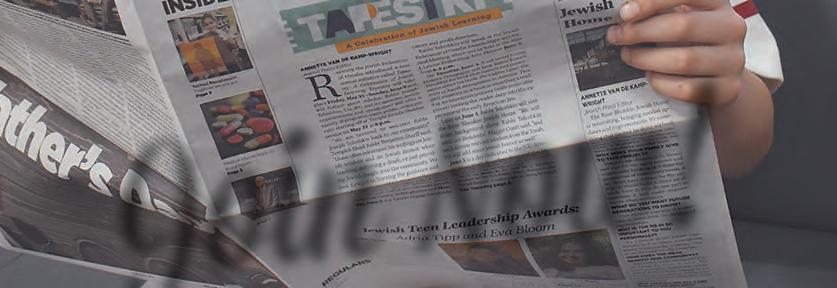







MARK KIRCHHOFF, Community Engagement and Education and NAOMI FOX, Assistant Director of Community Engagement and Education
From May 31 through June 9, the Jewish Federation of Omaha hosted Rabbi Joseph Telushkin. Rabbi Telushkin holds a significant place in the Jewish community due to his profound contributions as a scholar, educator, and author. His impact is multifaceted, encompassing ethical teachings, historical scholarship, and efforts to bridge understanding within and beyond the Jewish community.
The word “tapestry” is a fitting metaphor to describe ten days of educational presentations discussions, and religious obser-
vances by Rabbi Telushkin, evoking a sense of rich, intricate, and interconnected narratives that come together to form a cohesive and enlightening experience.
Rabbi Telushkin presented diverse themes, historical insights, moral lessons, and cultural contexts into a multifaceted Jewish educational journey.
“My sense is that Rabbi Telushkin relished his time here in Omaha for several reasons,” JFO CEO Bob Goldberg said. “Rabbi Telushkin specifically mentioned he had never experienced ‘a more harmonious Jewish community.’ I think that is a product of our culture here in Omaha. Tapestry’s organization and structure involved everyone and gave each of our JFO agencies, congregations, See Ten days of Tapestry page 2

SHIRLY BANNER
JFO Library Specialist
YOUNG ADULT: Across So Many Seas by Ruth Behar
Spanning over 500 years, Pura Belpré Award winner Ruth Behar’s epic novel tells the stories of four girls from different generations of a



Jewish family, many of them forced to leave their country and start a new life.
In 1492, during the Spanish Inquisition, Benvenida and her family are banished from Spain for being Jewish and must flee the country or be killed. They journey by foot and by sea, eventually settling in Istanbul.
STACIE METZ Program and Stewardship Administrator, JFO Foundation
The Jewish Federation of Omaha Foundation is honored to celebrate our 10th year partnering with the Harold Grinspoon Foundation to promote after-lifetime giving to benefit the Omaha Jewish community. Through training, support, and incentives Life & Legacy motivates Jewish organizations to integrate legacy giving into their philanthropic culture, assuring Jewish tomorrows.
In recognition of our milestone 10th Anniversary of Life & Legacy, we

are thrilled to welcome celebrated New York performer Ari Axelrod as he brings his internationally acclaimed show, A Place For Us: A Celebration of Jewish Broadway, to the Alan J Levine Performing Arts Theatre at the JCC on Thursday, Sept. 12 at 7 p.m. for a 90-minute performance, followed by a dessert reception.
A Place For Us is a celebration of Jewish culture, honoring the songs and stories of Jewish composers and their crucial contributions to the American musical. While there are many stories in the world about Jewish suffering, there are fewer stories about Jewish life and vitality.
Ari shared, “Our history is not only about how we survived but also about how we thrived, and A Place For Us highlights this in its exploration of Jewish Broadway. What a thrill to bring this show, which is in many ways about the importance of legacy, to such an incredible celebration. I hope to give Omaha audiences a rekindled love, a fresh understanding, and a newfound appreciation of songs we’ve all loved throughout the years. When I was 20 years old, I found that I had an Arnold-Chiari Malformation, which is a malformation of the brain stem. To have all the goals, plans, and dreams threatened to be taken away at that age put the See Life & Legacy page 3
Over four centuries later, in 1923, shortly after the Turkish war of independence, Reina’s father disowns her for a small act of disobedience. He ships her away to live with an aunt in Cuba to be wed in an arranged marriage when she turns fifteen.
In 1961, Reina’s daughter, Alegra, is proud to be a brigadista, teaching literacy in the countryside for Fidel Castro. But soon Castro’s crackdowns force her to flee to Miami all alone, leaving her parents behind. Finally, in 2003, Alegra’s daughter, Paloma, is fascinated by all the journeys that had to happen before she could be born. A keeper of memories, she’s thrilled by the opportunity to learn more about her heritage on a family trip to Spain where she makes a momentous discovery.
Though many years and many seas separate these girls they are united by a love of music and poetry, a desire to belong and to matter, a passion for learning, and their longing for a home where all are welcome. And each is lucky to stand on the shoulders of their courageous ancestors.
See Kripke-Veret page 3


Continued from page 1 and community partners a chance to determine their learning goals, the setting, and the participants for their individual session.”










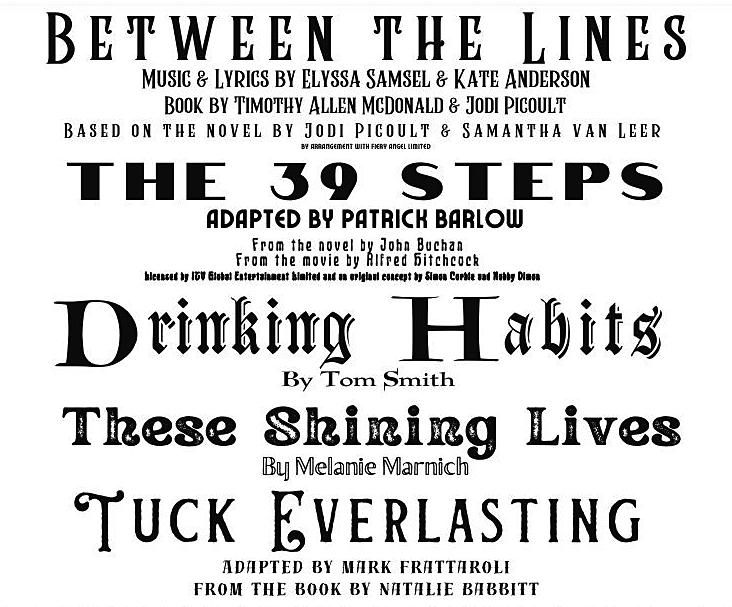

At the first Tapestry event, Rabbi Telushkin attended Temple Israel’s Shabbat Evening Services and delivered a talk about Moral Imagination: On Being a Good Person in a Morally Complicated World. The d’var Torah centered around navigating ethical dilemmas and using creativity to make moral decisions that foster a compassionate community ethos.
Saturday morning at Beth Israel Synagogue, Rabbi Telushkin explored the Value and Importance of Talmud Learning. This session delved into how Talmudic teachings continue to shape understanding of Jewish law and ethics. Rabbi Telushkin spent all of Shabbat day with the community at Beth Israel, leading an early evening learning session as well.
On Sunday morning at the Nebraska Jewish Historical Society Board Brunch, Rabbi Telushkin shared insights on The Story of Jewish Immigration in America alongside discussions about his mystery books. Participants engaged in a lively conversation exploring the challenges and triumphs of Jewish immigrants throughout history. In the evening, Rabbi Telushkin joined a small group dinner with the Klutznik Chair of Jewish Civilization and other Klutznick representatives, where discussions spanned various facets of Jewish culture and community.
Monday morning began with a meeting with education and youth directors in the community where Rabbi Telushkin focused on Engaging Jewish Educators. This session emphasized innovative strategies to enrich educational experiences. Later during the gathering of Rabbis and Presidents at JFO, discussions revolved around “Working together as a diverse Jewish community.” This session fostered a collaborative spirit and included a vibrant discussion. In the evening, Rabbi Telushkin spoke about the importance of Jewish youth experiences during the Federation’s Annual Meeting.
Tuesday morning began at B’nai Israel Living History Synagogue in Council Bluffs where Rabbi Telushkin engaged in an interview-style conversation on his book, The Golden Land: The Story of Jewish Immigration to America. Later that afternoon, he was at the Rose Blumkin Jewish Home where he shared a history of Jewish humor with plenty of jokes mixed in, aiming to uplift spirits and spark laughter among Residents. That evening, he met with BBYO teens at the JCC for an open conversation, discussing their perspectives and aspirations.
Wednesday morning, Rabbi Telushkin engaged in discussions with JCC directors about Judaism essentials for non-Jewish directors, touching upon topics like the Jewish calendar, antisemitism and answering their questions. He then joined Bread Breakers at JFO for a session on Jewish Humor where participants explored its cultural significance and shared laughter over amusing anecdotes and fantastic one-liners. In the evening, Rabbi Telushkin attended a viewing of The Quarrel at the Institute of Holocaust Education, offering initial comments to spark post-movie discussions on themes of guilt, reconciliation and faith.
Jewish Press Editor
We are pleased to announce Write With Us, a new collaboration between the Nebraska Jewish Historical Society and the Jewish Press. This fall we welcome Liz Kay, Creative Writing Coordinator at Metro Community College. Liz will lead four writing workshops at our Staenberg Kooper Fellman Campus. Workshops are scheduled for Aug. 6 and 13, and Sept. 5 and 19 from 5-7 p.m.
Cost is $18 per single workshop, and $54 for all four sessions. Thanks to our generous donors, college students can attend for free. Registration is now open on our website at www.omahajewishpress.com
Thursday morning began with the Jewish Press Board Breakfast, where discussions centered around “Kashrut” and its impact on Jewish identity and food traditions in the US. Later that afternoon during the TriFaith Conference, Rabbi Telushkin spoke about antisemitism and shared insights from his book, Why the Jews. His talk was focused on combating hatred and promoting understanding among diverse communities. In the evening, he joined the Friedel Jewish Academy for a family dinner and discussion on How to Raise Good Children in a Morally Complicated World, sharing parenting insights and fostering meaningful conversations. Friday morning, Rabbi Telushkin participated in a Community Conversation with JCRC and JFS on social justice, Jewish values, advocacy, and Hillel’s concept of Tikkun Olam, exploring avenues for collective action and advocacy. At noon, during the Foundation and Federation staff session, discussions revolved around tzedakah and its role in fostering communal generosity and support. Friday evening at Beth El Synagogue during Kiddush and Shabbat Services, Rabbi Telushkin spoke about What it means to be Jewishly Literate, emphasizing the importance of knowledge and understanding of Jewish identity. Following services, he attended a warm Shabbat Dinner hosted by Chabad of Nebraska, engaging in informal conversations about spirituality and community. Rabbi also attended services and Shabbat day at Chabad of Nebraska. By this point in his Omaha travels he was feeling like a real community member! Sunday morning concluded with Sunday Morning Tefillin Wraps at Chabad of Nebraska and our Community Event at the Jewish Federation of Omaha, marking the culmination of an enriching experience during Tapestry this year. The event included a book give-away.
“Our Jewish community easily shares space and intermixes together,” Goldberg added. “He may have seen folks at Temple for one program and at Chabad or at a JFO agency program for another. He was able to be in each of our congregations, visit Friedel, speak at B’nai B’rith, meet with our Rabbis and Presidents Committee, experience our Staenberg Kooper Fellman campus, and enjoy the comfort of staying in the Chabad guest house. Basically, he saw that we get along and work together to build Jewish community.”
Before leaving to catch his return flight to New York, Rabbi Telushkin answered a few last questions from the audience. Attendants were invited to participate in a brief survey of Tapestry. If you have not yet filled out the survey to give input and suggestions for future Tapestry celebrations, we invite you to do so by using the QR code included with this article.
Tapestry 2024 has been made possible thanks to the generosity of the Jewish Federation of Omaha, the Ann Goldstein Education Endowment Fund, the Herbert Goldsten Trust and the Klutznick Fund, all three at The JFO Foundation, with accommodations for Rabbi Telushkin provided by Chabad of Nebraska.

self you can’t write at all, but would love to try. Everyone, from absolute beginner to professional, is welcome to attend.

If you have wanted to write your family’s story, that great American novel, or you have always wanted to try your hand at poetry, this program is for you. Maybe you are already an accomplished writer, but you would benefit from being in a room with other writers. Perhaps you have convinced your-
During this process, we are hopeful to gather stories we can print in the Jewish Press and/or add to the NJHS archives. There are great stories in the Omaha Jewish community that have not yet been told in print. They are shared over dinner, during friend get-togethers, during the holidays, but they don’t always get written down. Both the NJHS and the Jewish Press exist to tell those stories, and we want to offer people an opportunity to come share their stories with us. That does not mean you have to share what you write with the public—it is entirely up to you, the participant. However, your story is worth telling, and it can be hard to know where to start, so let us help you!
This program is made possible through the generous support of the Shirley and Leonard Goldstein Supporting Foundation. Please stay tuned for more information!
Continued from page 1
very powerful and very finite nature of time into perspective. I now live with a clean bill of health. I’ve contributed to numerous Chiari Malformation studies around the world, and I am choosing to live every second of my new lease on life to the fullest.”
The Jewish Week awarded Ari the prestigious 36 To Watch Award, recognizing him as one of the 36 most influential Jews in the United States. A Place For Us was hailed by BroadwayWorld as “genuinely one of the finest shows this writer has ever seen.” Ari is thrilled to be in Omaha for his performance of A Place For Us. This internationally acclaimed, award-winning show is one not to miss!
Sharon Brodkey, JCRC Executive Director, shares “I have had a front-row seat and the privilege of watching Ari grow up, literally and figuratively. As an artist, and a powerful Jewish advocate, he truly is a force! And since I have missed every live Birdland and Feinstein’s appearance and had to watch from the virtual cheap seats via video clips from his folks, I am especially looking forward to seeing him perform live here in Omaha!”
To RSVP for this free event, or for an questions, please contact Stacie Metz at smetz@jewishomaha.org or 402.334.6485.
B’NAI B’RITH BREADBREAKERS
The award-winning B’NAI B’RITH BREADBREAKERS speaker program currently meets Wednesdays via Zoom from noon to 1 p.m. Please watch our email for specific information concerning its thoughtprovoking, informative list of speakers. To be placed on the email list, contact Breadbreakers chair at gary.javitch@gmail.com ORGANIZATIONS
Continued from page 1
ADULT:
The Joy of Costco: A Treasure Hunt from A to Z by David and Susan Schwartz
A whirlwind tour of Costco warehouses around the globe. Since 2016, David and his wife Susan have been to over 250 of Costco’s 850+ warehouses, plus gotten behind-thescenes looks at one of the world’s favorite retailers.
Topics are covered in a whimsical A to Z format, using Q & A to delight the more than 128 million Costco members and over 300,000 dedicated Costco employees.
The prologue describes how the authors came to write and self-publish the book. Also included is a brief narrative history of Costco dating back to a Jewish San Diego lawyer named Sol Price who founded Price Club, Costco’s predecessor, and continuing with Costco’s founding by Jim Sinegal, Sol’s protégé, and Jeff Brotman, a Jewish Seattle retailer.
Sample Fun Facts: Costco sells more than half of the world’s cashews and seven times more hot dogs than all MLB stadiums combined.
The Cost of Free Land: Jews, Lakota, and an American Inheritance by Rebecca Clarren
An award-winning author investigates the entangled history of her Jewish ancestors’ land in South Dakota and the Lakota, who were forced off that land by the United States government

Growing up, Rebecca Clarren only knew the major plot points of her tenacious immigrant family’s origins. Her great-great-grandparents, the Sinykins, and their six children fled antisemitism in Russia and arrived in the United States at the turn of the 20th century, ultimately settling on a 160-acre homestead in South Dakota. Over the next few decades, despite tough years on a merciless prairie and multiple setbacks, the Sinykins became an American immigrant success story.




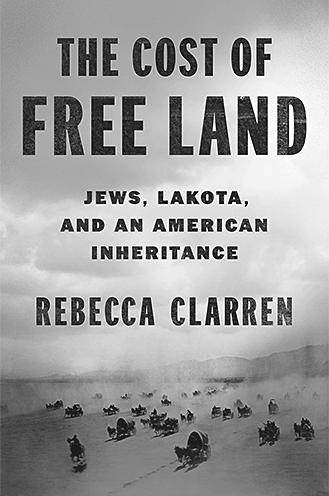
What none of Clarren’s ancestors ever mentioned was that their land, the foundation for much of their wealth, had been cruelly taken from the Lakota by the United States government. By the time the Sinykins moved to South Dakota, America had broken hundreds of treaties with hundreds of Indigenous nations across the continent, and the land that had once been reserved for the seven bands of the

Lakota had been diminished, splintered, and handed for free, or practically free, to white settlers. In The Cost of Free Land, Clarren melds investigative reporting with personal family history to reveal the intertwined stories of her family and the Lakota, and the devastating cycle of loss of Indigenous land, culture, and resources that continues today. With deep empathy and clarity of purpose, Clarren grapples with the personal and national consequences of this legacy of violence and dispossession. What does it mean to survive oppression only to perpetuate and benefit from the oppression of others? By shining a light on the people and families tangled up in this country’s difficult history, The Cost of Free Land invites readers to consider their own culpability and what now can be done.
JFO PJ Library Coordinator
SCOTT LITTKY
Institute for Holocaust Education Executive Director
The August IHE 3rd Thursday Lunch & Learn program will be on Thursday, Aug. 15 at 11:30 a.m. on ZOOM. Though Cyd Gottlieb never personally met her Holocaust Survivor grandparents as a child she gained a deep understanding of their respective journeys through various ghettos, concentration camps, displaced persons camps, and countries from a box of documents kept on the top shelf of a closet. Inside she found authentic primary documents of different paper types, fonts, chronological stamps, seals,
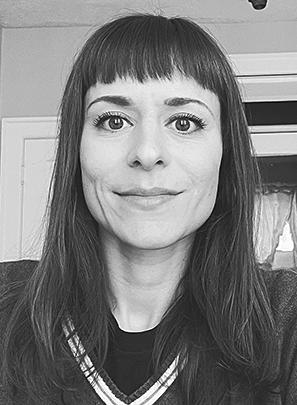
and languages. By following patterns and details, she figured out how to understand what words could not describe. In 2023, with this trove of information, Cyd completed 3GNY’s WEDU speaker training course to better learn how to distill her family narrative and contribute to public Holocaust education. As a visual artist Cyd also integrates storytelling into her work. In 2025, she will show with the Burkholder Project (Lincoln, NE), and her forthcoming solo exhibition will explore intimate stories of starting over – diving into ideas of ownership, survival, and refugee history within a contemporary context. Mimicking her own method of discovery, Cyd plans to present combinations of collected materials with drawn and painted applications to create artworks that usher along a broad range of multimedia play. Hear more about how Cyd intertwines factual narrative with her own expressive output on Aug. 15 through the IHE’s 3rd Thursday Lunch and Learn Program.
For more information or to register, please email - Scott Littky - slittky@ihene.org
PAM MONSKY
JCRC Assistant Director
The Jewish Community Relations Council (JCRC) and the Jewish Federation of Omaha Foundation look forward to bringing our college students together at the Jewish Community Center on Sunday, Aug. 4 from 5:30 p.m.–7:30 p.m. for Campus Connection - a dinner and conversation featuring stories from their peers, tools and resources to help them when encountering antisemitism on campus.
More than 150 North American college campuses have experienced loud and sometimes violent anti-Israel and antisemitic attacks since October 7. Jewish students have been harassed, threatened, blocked from accessing their classrooms, and even physically assaulted, which represent a clear violation of their civil rights.
Zev Gordman, who attends University of Miami, shared, “I’m eager to hear my peers’ experiences to gain a deeper understanding of the issues we face. This knowledge will further help us find ways to improve our awareness and support college students across the country.”
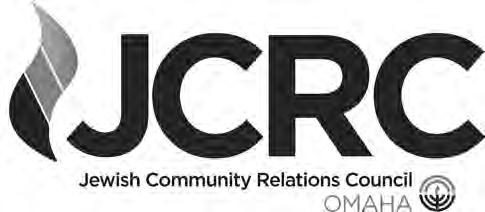
“In these unprecedented times, there’s nothing more important than uniting in our shared passion for Judaism. Whether you’re secular, religious, or anywhere in between, we must rely on each other to strengthen and uplift our community,” shared Harper Gordman, who attends University of Nebraska at Lincoln.
A falafel bar will be provided, and students will leave with an awesome back-to-school swag bag, including an Uber gift card! Contact Pam Monsky at pmonsky@jewishomaha.org to reserve your student’s spot!
Omaha-area families raising Jewish children will now have more opportunities to participate in Jewish life, thanks to an engagement grant recently awarded by PJ Library®, the flagship program of the Harold Grinspoon Foundation, which provides free books to families raising Jewish children all over the world.

The Jewish Federation of Omaha received $3,500 to launch Taste of Jewish Omaha which will introduce a series of childparent friendly cooking classes in collaboration with local Jewish organizations. These classes aim to foster connections with community organizations, introduce families to diverse Jewish cultures, and cultivate friendships through interactive culinary activities.
Tracy Newman, director of community engagement for PJ Library, says, “These dollars have a profound impact on Jewish communal life in our partner communities. The grants showcase PJ Library’s best practices for engaging a wide range of diverse families, enriching micro-communities and fostering a vibrant, dynamic Jewish community.”
The Jewish Federation of Omaha is honored to receive this grant and thrilled to be part of the global PJ Library community, which distributes books in seven languages to more than 650,000 children in over 40 countries every month.
The 29 winning grant proposals were chosen through a competitive process open to organizations implementing PJ Library across the United States and Canada. A survey of participants in previous grant-funded projects showed the 87% of participating families connected socially during the programs building friendships that allowed them to be more comfortable participating in Jewish life. Last year projects saw that 71% of families sought out or attended other local Jewish programs following their participation in the PJ funded program.
TO SUBMIT ANNOUNCEMENTS
Announcements may be e-mailed to the Press at jpress@ jewishomaha.org; mailed to 333 So. 132 St., Omaha, NE 68154.
Readers can also submit announcements -- births, b’nai mitzvahs, engagements, marriages, commitment ceremonies or obituaries -- www.omahajewishpress.com/site/ forms/ Click on “Jewish Press” and go to Submit Announcements.









PAM MONSKY
JCRC Assistant Director
Please join the Jewish Community Relations Council (JCRC) for an exclusive event Tuesday, Aug. 20. In partnership with HBO and the Secure Community Network, the Omaha Jewish community has been chosen for a screening of the HBO documentary A Tree of Life: The Pittsburgh Synagogue Shooting on Aug. 20 at 6:30 p.m. in the Alan J. Levine Theater at the Staenberg Kooper Fellman Campus of the Jewish Community Center. The film will be followed by a panel discussion with Stephanie Viegas, SCN Deputy National Security Advisory and Carol Black, a survivor of the attack – the deadliest assault on the American Jewish community in U.S. history.

The following day, Aug. 21, from 11:30 a.m.-1:30 p.m. law enforcement agencies and the community are invited to a security training hosted by SCN and the Jewish Federation of Omaha in the Goldstein Engagement Venue. Lunch is included at no cost.
Registration is required for both events using the QR code or emailing pmonsky@jewishomaha.org
This event is generously sponsored by the Jule M. Newman Anti-Bigotry Fund.
ABOUT THE FILM: On Oct. 27, 2018, a gunman opened fire inside a Pittsburgh synagogue, murdering 11 people as they
prayed, in what would become the deadliest antisemitic attack in American history. A Tree of Life: The Pittsburgh Synagogue Shooting is a deeply personal portrait of the survivors, victims, and family members, who share their harrowing firsthand accounts of the impact of the shooting on the community. The film is rooted in a community working to rebuild and heal in the aftermath of a violent attack. Despite core differences, they come together to determine what justice looks like and how best to move forward while honoring and learning from the past. The film sheds light on the collective trauma suffered by a tight-knit group and brings into sharp focus the hate-based


rhetoric surrounding many of the mass shootings today, threatening the fabric of our society. The story of the attack is told through voices from the community, including Carol Black, Dr. Joseph Charny, Anthony Fienberg, Martin Gaynor, Audrey Glickman, Daniel Leger, Hannibal Lokumbe, Wasi Mohamed, Rabbi Jeffrey Myers, Brad Orsini, Rabbi Jonathan Perlman, Michele Rosenthal, Diane Rosenthal, Augie Siriano, Ellen Surloff, Andrea Wedner, Stephen Weiss, Barry Werber, Eliezer Rosenthal, and Joy Rosenthal.


Even though Columbia University has been frequently in the news over the past nine months because of antiIsrael protests, and even though I am an alumnus of its college, I didn’t feel that I could contribute any special insight to the discussion. Things changed on Monday July 8, when Columbia dismissed three college administrators for anti-Jewish text messages. The messages, according to Columbia University President Nemat Shafik, were “unacceptable and deeply upsetting, conveying a lack of seriousness about the concerns and the experiences of members of our Jewish community.” The Dean of Columbia College, Josef Sorett, was also involved in this messaging, but he has been allowed to stay in his post. In its article on what some are calling “textgate,” the New York Times also reported that over 1,000 Columbia alumni had signed on to a petition for the removal of Dean Sorett. But wait! Doesn’t the name “Sorett” sound kind of Jewish? Dear Reader, you know that I rarely toot my own horn; you know that I actually look to self-deprecate (and if possible in a humorous way), but here I have to say that I was way, way ahead of things, for I identified Sorett’s “Jewish problem” shortly after he was appointed Dean of Columbia College. The cover story of the Fall 2022 edition of Columbia College Today was: Get to Know the College’s New Leader in our Exclusive Q&A. In the piece, written by the editor of CCT Alexis Boncy, Sorett describes his background as “quintessentially and unexceptionally a Black American story.” In an email to Boncy written as an Open Letter to Sorett and thus addressed to him, I wrote:
“I was dismayed by your discussion of your Jewish heritage. You seemed to discount the fact that Judaism is not just a religion but a people. Though you say that your father ‘grew up in a Jewish home,’ you describe your biography as ‘quintessentially, and unexceptionally, a Black American story.’ I am stunned that you betrayed not the slightest indication that your story is also a Jewish American story, although it is the story of the complete erasure of the Jewishness of a family line. One has the impression from your remarks that the reader can easily understand how it
came to be that your father’s parents, whom you say ‘were not observant in any theological sense, but rather were a prototypical secular Jewish family,’ become the grandparents of your ‘Black American story.’ But many secular Jews are proud of their Jewishness, and the vast majority of them (unlike your father) do not end up converting to a different religion. So I for one am very interested in the relationship you had with your father’s family, and given that there are thousands of Jewish Columbia graduates, I imagine that I might not be alone here. Did you know your paternal grandparents? Did you visit them? Were they Holocaust survivors? Were they immigrants or children of immigrants? What was the family name in Europe? Do you have any Jewish first cousins? I have to say that the offhanded way that you speak of your Jewish heritage was jarring to me. I would not have troubled you with this letter were it not for the fact that we are at a particularly fraught period of Black-Jewish relations in the U.S. The narrative of your personal history that you presented to CCT readers is a narrative of erasure of one of your two ethnicities. I am wondering if there is a way for you to reclaim some of this erasure as a way for American Jews and Blacks to move forward.”
Sadly, I did not hear back from Sorett (I had also emailed the letter directly to his office), and sadly Boncy declined to publish my letter, writing: “While Dean Sorett shared his background in the interview, engaging in and promoting further discussion of his personal history and religious beliefs isn’t appropriate for the magazine.”
In the wake of the petition to dismiss the Dean, I wrote Boncy, giving it the old college try (again), saying: “Precisely at Columbia, I learned the value of frank and honest discussion. I don’t think it’s at all hyperbolic to say that had my letter been taken seriously by the Dean, a discussion might have ensued that might have left the Dean better suited for a post-Oct. 7th Columbia. I encourage you to print my Open Letter. It is not too late for the Dean to engage in dialogue on this matter.”
I’m still waiting.
Teddy Weinberger, Ph.D., made aliyah with his wife, former Omahan Sarah Jane Ross, and their five children, Nathan, Rebecca, Ruthie, Ezra, and Elie, all of whom are veterans of the Israeli Defense Forces; Weinberger can be reached at weinross@gmail.com






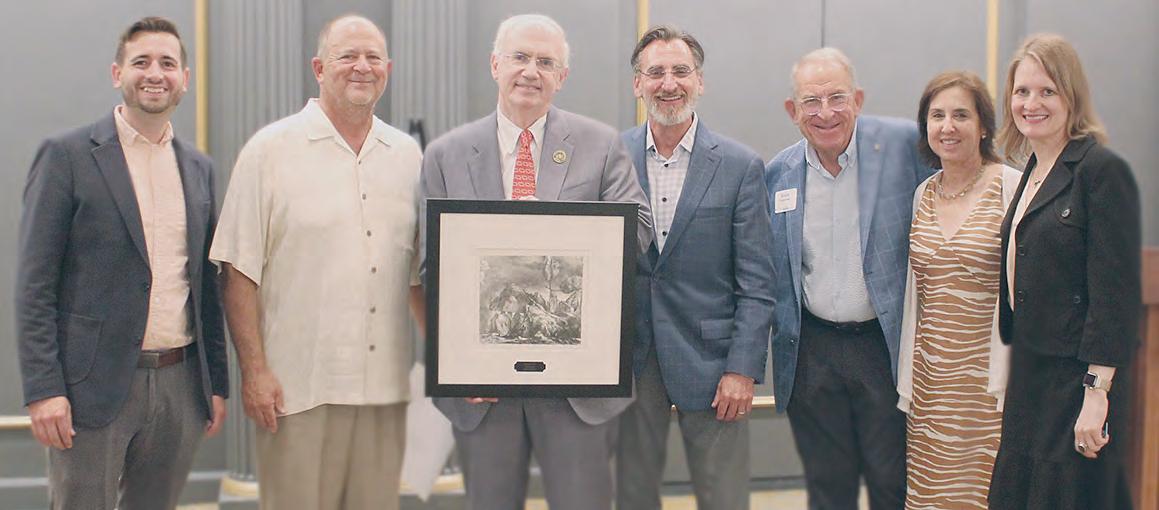
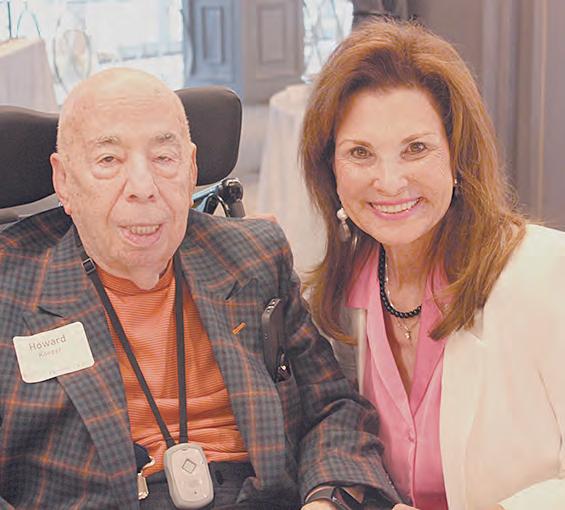
ANNETTE VAN DE KAMP-WRIGHT Jewish Press Editor
On July 9 the Rose Blumkin Jewish Home and the Jewish Federation of Omaha hosted the “Enhancing Quality of Life Campaign” information and solicitation event at Happy Hollow. A robust crowd of approximately 100 community members gathered for cocktails and hors d’oeuvres.
The event featured guest speaker Dr. Jeffrey Gold, president of the University of Nebraska System.
Dr. Gold spoke about the University of Nebraska and the importance of education. He also emphasized how essential subacute care in a long-term care facility is, and the utmost need for privacy and dignity for our Residents. Bruce Friedlander, co-Chair of the Enhancing Quality of Life campaign, presented him with a gift of framed artwork by Samuel Bak.
The health care environment changes constantly and yet, the RBJH has maintained its position as a top-notch home in the Omaha area. The current goals are to provide a better quality of life for Residents of the Home, including private rooms, and to keep the Home financially viable in the future.
“We have to ask ourselves one question, JFO CEO Bob Goldberg said. “Is it important that we have the Rose Blumkin Jewish Home as a place where our Jewish community members can come to and be cared for with our community, by our community, on our community campus... or not? If the answer is yes, and I certainly believe that, then we need to make this happen. It is of the utmost importance that the Rose Blumkin Jewish Home continue to be the crown jewel of our campus where we care for, and about, our community members.”
This Enhancing Quality of Life Campaign for the Rose Blumkin Jewish Home represents not only a large financial investment in the physical property, it also represents changes to the way we operate, transitioning to single-occupancy rooms and updating our Resident mix according to the current marketplace. We do not take these changes lightly, but we can have confidence that our costs are in line with industry standards and that our business model is not only where the market is moving; it is where the market already is.
Jeff Kirshenbaum gave the audience an update about the project’s construction costs, which have been monitored closely by a committee of leading experts. Each detail of the improvements and construction phases has been reviewed.
“Residents expect top-shelf care when they come to the Rose Blumkin Jewish Home,” Bob said. “That is the reputation that the Home has earned over many years. We know that Residents deserve dignity, independence, and privacy when they come to the Home. And to be that place where our community members choose to go when they need a place to go to, we need to provide the space that provides them with the quality of care, and dignity that they deserve and that we expect.”
He further told those in attendance:
“I want to give you a quick update on the project. We are doing well, and we still have a ways to go. The entire project has a price tag of $23 million. This includes a first phase of re-
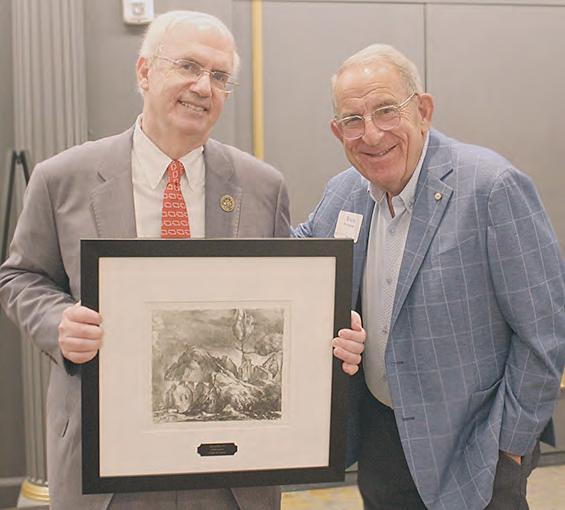
modeling the existing footprint. This will bring more light and brightness and openness and it will give us space that is more efficient and better aligned with the way our staff and residents interact. This part of the project is about one-third completed and if all goes as planned, this phase will be finished in the first quarter of 2025.
“The second phase, which has not yet been approved by the Federation board, is the expansion of the new units which will allow us to convert to single occupancy rooms. There will still be a few double rooms for couples or those that wish to share, but the majority of rooms will be private.
“We are currently licensed for 105 beds and expect to expand that to at least 110 beds. The current facility has 66 rooms, and some might ask, why not just convert the current space to single rooms? The answer is that the business model doesn’t work at 66 beds.
“Of the $23 million needed to complete the project, we have raised $11.5 million, basically in a quiet fundraising phase. And this includes an exciting $1 million dollar gift from the Blumkin family. Thank you, thank you, thank you, thank you to the Blumkin family. To Irv and Susie, Ron and Chris, Steve and Cindy, and your families... we thank you for continuing to strengthen the legacy of the Rose Blumkin Jewish Home for generations to come.
“Some of you may recall that when the home was last renovated back in 2007-2008, the price tag on that project was almost an identical $23 million. At that time, the project raised $17 million from the community and borrowed $6 million from the Blumkin Home’s own endowments. Those borrowed funds have been paid back in full. And that same model and methodology is possible again this time. When we reach the $17 million dollar mark in our fundraising, we can go to the Federation’s Board of Directors and ask to borrow up to $6 million from the Home’s own endowments, with the understanding that future Blumkin Home profits go to pay back these endowments until they are paid back in full.
So, our immediate goal is to raise another $5.5 million and get to $17 million raised by the community. We are on our way, and we will succeed with your help.”
We are a purpose driven organization. Our purpose, as a Jewish Federation, is to care for and about one another. At the Rose Blumkin Jewish Home, that means ensuring that Residents have the best possible care, respect, and regard for their well-being.
We will always pursue our purpose and mission with vigor, and we will always treat the precious dollars that we are entrusted with the utmost care and respect.
Since the July 9 event, there has been great momentum in the campaign, with some donors increasing or even doubling their gift. In next week’s Jewish Press, we’ll announce a leading gift, and we hope you will all feel inspired to join the Enhancing Quality of Life campaign. Our Rose Blumkin Jewish Home Residents deserve the very best.



PHOTOS FROM RECENT JEWISH COMMUNITY EVENTS
SUBMIT A PHOTO: Have a photo of a recent Jewish Community event you would like to submit? Email the image and a suggested caption to: avandekamp@jewishomaha.org
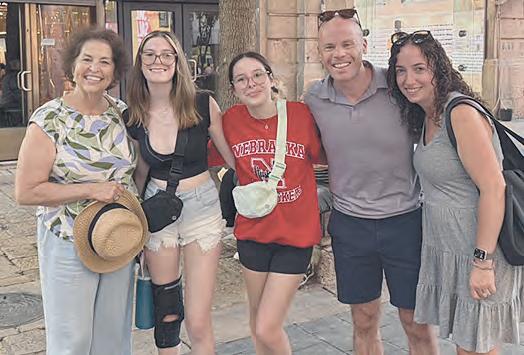
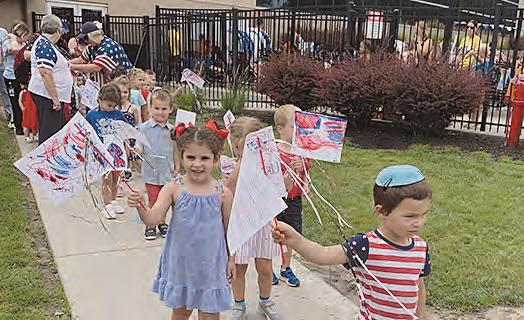

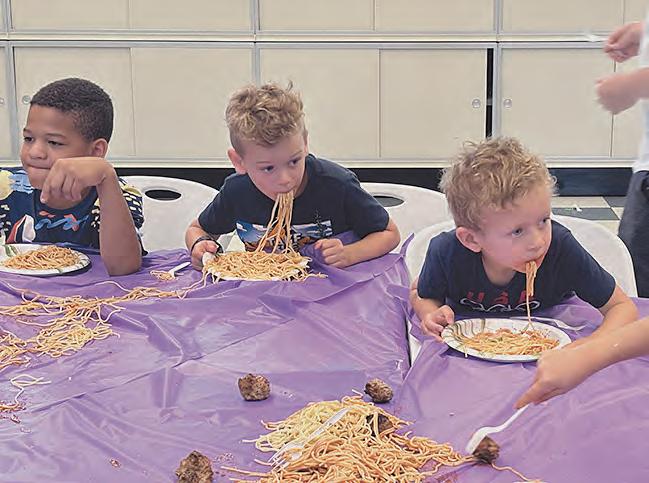


GENEROUSLY SUPPORTED BY
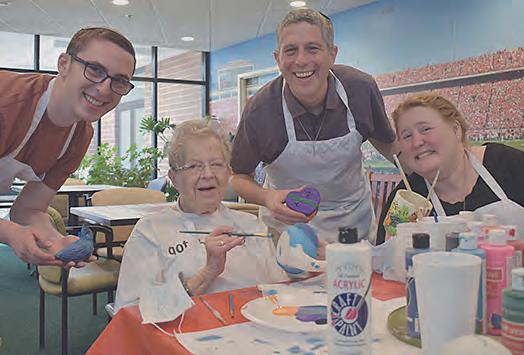
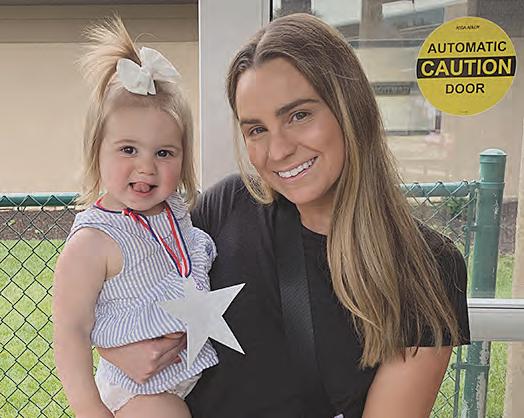




(Founded in 1920)
David Finkelstein
President
Annette van de Kamp-Wright
Editor
Richard Busse
Creative Director
Lori Kooper-Schwarz
Assistant Editor
Melanie Schwarz
Intern
Sam Kricsfeld
Digital support
Mary Bachteler
Accounting
Jewish Press Board
David Finkelstein, President; Margie Gutnik, Ex-Officio; Helen Epstein, Andrea Erlich, Ally Freeman, Dana Gonzales, Mary Sue Grossman, Hailey Krueger, Chuck Lucoff, Larry Ring, Melissa Schrago, Suzy Sheldon and Stewart Winograd.
The mission of the Jewish Federation of Omaha is to build and sustain a strong and vibrant Omaha Jewish Community and to support Jews in Israel and around the world. Agencies of the JFO are: Institute for Holocaust Education, Jewish Community Relations Council, Jewish Community Center, Jewish Social Services, Nebraska Jewish Historical Society and the Jewish Press Guidelines and highlights of the Jewish Press, including front page stories and announcements, can be found online at: www.jewishomaha.org; click on ‘Jewish Press.’ Editorials express the view of the writer and are not necessarily representative of the views of the Jewish Press Board of Directors, the Jewish Federation of Omaha Board of Directors, or the Omaha Jewish community as a whole. The Jewish Press reserves the right to edit signed letters and articles for space and content. The Jewish Press is not responsible for the Kashrut of any product or establishment.
Editorial
The Jewish Press is an agency of the Jewish Federation of Omaha. Deadline for copy, ads and photos is: Thursday, 9 a.m., eight days prior to publication. E-mail editorial material and photos to: avandekamp@jewishomaha.org ; send ads (in TIF or PDF format) to: rbusse@jewishomaha.org
Letters to the Editor Guidelines
The Jewish Press welcomes Letters to the Editor. They may be sent via regular mail to: The Jewish Press, 333 So. 132 St., Omaha, NE 68154; via fax: 1.402.334.5422 or via e-mail to the Editor at: avandekamp@jewishomaha.org.
Letters should be no longer than 250 words and must be single-spaced typed, not hand-written. Published letters should be confined to opinions and comments on articles or events. News items should not be submitted and printed as a “Letter to the Editor.”
The Editor may edit letters for content and space restrictions. Letters may be published without giving an opposing view. Information shall be verified before printing. All letters must be signed by the writer. The Jewish Press will not publish letters that appear to be part of an organized campaign, nor letters copied from the Internet. No letters should be published from candidates running for office, but others may write on their behalf.
Letters of thanks should be confined to commending an institution for a program, project or event, rather than personally thanking paid staff, unless the writer chooses to turn the “Letter to the Editor” into a paid personal ad or a news article about the event, project or program which the professional staff supervised. For information, contact Annette van de Kamp-Wright, Jewish Press Editor, 402.334.6450.
Postal The Jewish Press (USPS 275620) is published weekly (except for the first week of January and July) on Friday for $40 per calendar year U.S.; $80 foreign, by the Jewish Federation of Omaha. Phone: 402.334.6448; FAX: 402.334.5422.
Periodical postage paid at Omaha, NE. POSTMASTER: Send address changes to: The Jewish Press, 333 So. 132 St., Omaha, NE 68154-2198 or email to: jpress@jewishomaha.org
Editorials express the view of the writer and are not necessarily representative of the views of the Jewish Press Board of Directors, the Jewish Federation of Omaha Board of Directors, or the Omaha Jewish community as a whole.
ANNETTE VAN DE KAMP-WRIGHT Jewish Press Editor
If you’re anything like me, you might not exactly know who Anna Redman is. According to JTA’s Jackie Hajdenberg, she is “a social media influencer and former contestant on The Bachelor.”
I never watch dating shows and I’m not super keyed-in to influencers, so I only hear about these types of people when they are in trouble. Anna Redman is in trouble, so I now know who she is. And you will, too.
Here’s what she did: she shared a screen recording of her “packing notes” and the outfits she planned to wear on an upcoming trip to Poland and other countries. The trip in question included a visit to Auschwitz. Redman announced what she would wear on that visit.
“The text,” Hajdenberg wrote, “written in pink lettering and highlighted in pink, said: ‘The best packing ‘hack’,’ followed by ‘Is somebody going to match my freak?’ referring to the lyrics from Nasty, by Tinashe — a popular song on the charts and on TikTok.”
From sharing what to wear when you visit a concentration camp to referring to a popular song, it’s not a good look. But, hear me out, is it okay if I’m not completely upset over this?
Redman posted the following:
“I’m severely sorry for any pain I caused when sharing my packing notes story. I understand how flippant it came off.... I understand that [sic] heaviness of visiting Auschwitz and have been planning accordingly since we added seeing it in our travel
plans. Again, I’m very sorry and took it down as soon as I understood that [sic] gravity of the mistake I made. I had no ill intentions behind it AT ALL. And I hope you guys can understand that.”

I believe her, I think. She did something insensitive, and then she apologized. She didn’t make any excuses for her behavior either, which is refreshing. On top of that, there are quite a few people out there who are doing much, much worse. Finally, I think: at least she went to Auschwitz. How many people in her generation can’t even find Poland on a map?
But then I had this horrible thought: am I poohpoohing antisemitism? It’s a valid question, be-
cause I’ve noticed I’m all over the place these days. Sometimes I’m taking a no-prisoners approach, no excuses, zero tolerance for anything, no matter how small. Other days I think if nobody’s actually bleeding, we are alright. Sometimes I switch back and forth several times in the same day. There are days I get mad, and my family tells me to calm down; other times it’s the other way around. It’s almost like there are no clear rules anymore about when to get upset. I find that problematic. And so, I keep trying to categorize what Anna Redman did, hoping to justify my own feelings. Reminding myself it’s okay to not be upset this one time. I can’t be angry all the time. The post is already off Instagram anyway. If it is indeed antisemitism, it’s antisemitism born of ignorance, and not malice. She learned her lesson. And so on, and so forth. Meanwhile, I’ve wasted an hour obsessing over this. Can’t I have a measured, intelligent, normal response, for once?
Oh, wait. What if this confused, messy, uncoordinated reaction IS my normal response? Can it be okay to sometimes not know how to feel?
Why the Entebbe rescue almost didn’t happen — and how Israel is still wrestling with the same tough questions 48 years later
AMI EDEN
As expected, on July 4, 1976, the United States celebrated its bicentennial with a flurry of patriotic pride and hype. The surprise was that the day also brought one of the most miraculous events in Jewish history: Israel’s rescue of 102 hostages being held over 2,500 miles away at an airport in Entebbe, Uganda.
A week earlier, on June 27, terrorists from the Popular Front for the Liberation of Palestine and a radical West German group hijacked an Air France airliner full of Israeli passengers and redirected it to the Entebbe Airport. The hijackers warned that if their demands – including the release of several dozen prisoners being being held in Israel and elsewhere – were not met, they would begin killing hostages. Israel dispatched multiple aircraft with 100 commandos for a rescue mission that astonished the world. Three hostages died during the rescue, and only one Israeli soldier was killed: mission leader Yoni Netanyahu.
Fast forward 48 years, and Yoni’s younger brother is now the prime minister, with Israel grappling with a longer-lasting and much more extensive hostage crisis. Not only were hundreds of people taken from Israel on Oct. 7, but this time the hostages were abducted from their homes and military bases on Israeli soil, in a broader attack that killed 1,200 people. With the exception of more than 100 hostages — mostly women and children — released through deals, most have spent nearly nine months in captivity, with little information known about their whereabouts or wellbeing.
The legacy of the raid on Entebbe is complicated: It endures as an inspiring embodiment of Israeli boldness and ingenuity – but one that set a nearimpossible bar for success and has proven to be the exception to the rule in securing the release of hostages.
Multiple times since then, Israel has agreed to prisoner releases, and at a much worse exchange rate than the Entebbe hijackers were demanding. Back in 2011, Benjamin Netanyahu agreed to free 1,027 Palestinian prisoners in exchange for one soldier, Gilad Shalit, who spent five years in Hamas
captivity in Gaza.
During the current war, Israel has staged three rescue missions, leading to the release of a combined seven hostages. However fleeting, the operations produced collective moments of relief and joy in Israel and among many Jewish communities around the world.
But far more of the captives came home after the deal struck on Nov. 22, 2023, when Israel and Hamas agreed to the release of hundreds of Palestinian prisoners during a cease-fire that was extended to a week. Almost all of the 109 hostages released by Hamas were freed by the end of November, during that truce. Israel has reportedly agreed in principle to release hundreds more Palestinians, including 100 serving life sentences for killing Israelis, as part of a wider multi-phased deal to get back what Israel says are 116 remaining hostages plus four whose captivity predates the war. More than 40 of those are thought to be dead.
Avner — an adviser and speechwriter for multiple Israeli leaders — provided a behind-the-scenes account of the crisis.
Then, as now, families of the hostages were demanding the government make a deal. Similarly, there were those opposed to any concessions, arguing that it would reward terrorism and incen-
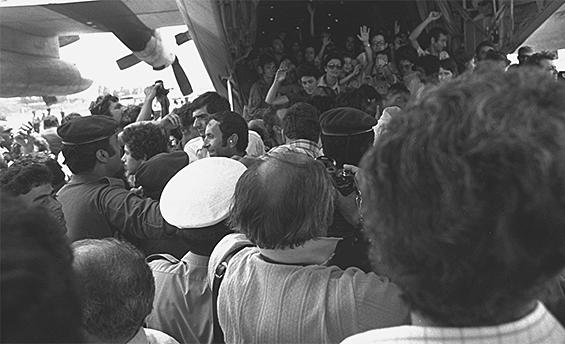
Meanwhile a national debate has raged, with hostage families and their supporters waging a sustained protest movement to pressure the government to agree to a deal, even if it means accepting a ceasefire that falls short of dismantling Hamas. Former Israeli war cabinet minister Benny Gantz seemed to endorse this view after pulling out of the government a few weeks ago, which was followed with several reports of military officials increasingly making the case that securing a deal to free the hostages should now take precedence.
At this point, no one is talking about an Entebbestyle operation to save the bulk of the remaining hostages, who are thought to be held in separate locations across Gaza. What’s often lost in the nostalgic euphoria and mystique that still surrounds the historic rescue mission is just how close it came to never happening — because Israel was prepared, if need be, to end the crisis by bowing to the hijackers’ demand for a prisoner release.
In his 2010 memoir The Prime Ministers, Yehuda
tivize future hostage-taking. According to Avner’s account, the debate was playing out at the highest levels of the government, between Prime Minister Yitzhak Rabin and his political rival, Defense Minister Shimon Peres.
The twist: It was Rabin, an architect of Israel’s daring military strategy almost a decade earlier in 1967, who argued in a top-level closed-door discussion early in the crisis that a deal might be the only option. Peres, later to emerge as Israel’s most prominent dove and champion for compromise with the Palestinians, “delivered an impassioned address on the implications of capitulation to terrorist blackmail,” Avner wrote.
Rabin pressed the IDF chief of staff, Mordechai “Motta” Gur, asking if Israel had a viable military option for saving the hostages. Working on it, but not yet, was the gist of the general’s reply.
The prime minister adjourned the meeting, but See Why the Entebbe rescue page 9
RABBI DIANE ELLIOT
This story was first published on My Jewish Learning. Jewish texts abound with wells. In the dry seasons of the ancient Near East, no less than in today’s Israel, access to water defined the viability of life, both for the people and the flocks and crops they tended. The well or spring, a source of life-giving fresh water bubbling up from deep within the earth, serves as the fulcrum for many key moments in the Torah narrative.
In Genesis, Hagar, cast into the desert and dying of thirst with her son Ishmael, is saved when God reveals to her a well of water. Abraham cuts a deal with Avimelech over the well at Beersheva (literally the “Well of Seven”), offering up seven ewes to secure his water rights. Isaac, Jacob and Moses all find their wives at wells, while Isaac must re-dig the stopped-up wells his father Abraham had dug long ago to reclaim his patrilineal heritage of blessing and peace. More than a physical locus, the well is a resonant symbol of connection, transformation and blessing, the nexus where love blossoms, marriage matches are made, treaties are struck and revelation unfolds.
as rebels and striking a rock in frustration rather than speaking gently, faithfully, as God has instructed him. In his anger, his dishonoring of God’s word, Moses seals his own fate; he too will die in the wilderness, barred from entering the land of promise with this people he has carried so far for so long.
Like the ancient Israelites, we don’t always take the time and space we need to mourn our dead, our lost dreams. Jewish mourning practices wisely follow the example of the biblical patriarch Abraham, who comes to sit with the body of his beloved wife Sarah when she dies, telling the story of her life and wailing in grief.

Perhaps the most fascinating and mysterious of all the biblical wells is Miriam’s Well, the spring of fresh water that accompanies the Israelites on their long wilderness sojourn. This miraculous well, said by the sages to have been one of 10 supernatural things created by God at twilight on the eve of the very first Shabbat, follows the people thanks to the merit of Miriam, the midwife and prophetess, dancer and drummer, revered elder sister of Moses and co-leader of the people.
In this week’s Torah portion, Miriam dies in the wilderness of Zin and, inexplicably, the people do not mourn her. Instead, they grouse and rebel against Moses and Aaron, their remaining leaders, because suddenly there is no water. The fabulous well has disappeared.
Reading this story year after year, I often wonder what might have happened if the people had taken time to mourn, to grieve the loss of their beloved leader and all the losses they sustained through their many years of wandering — the plagues, the punishments, the people incinerated on the altar of God and swallowed up by the earth. If they, along with Moses and Aaron, had been able to deeply feel the pain of all they had lost, to mourn the whole generation that had emerged from the slave houses of Egypt only to die in the wilderness, to truly let their hearts break, maybe the well would have continued to flow, fed by streams of their tears of anguish and sorrow.
Instead, the people become belligerent in their demand for water. And Moses responds in kind, angrily calling them out
A chorus of Israeli and Palestinian teens won hearts, applause and a chance at $1 million with a successful America’s Got Talent audition that aired on Tuesday night.
The Jerusalem Youth Chorus performed Phillip Phillips’ “Home,” an anthem that envisions a safe and comfortable future after difficult times — with lyrics whose resonance in the post-Oct. 7 climate are unmistakeable.
“Settle down, it’ll all be clear. Don’t pay no mind to the demons — they fill you with fear. The trouble, it might drag you down; if you get lost, you can always be found,” sang 20 teens and young adults wearing jackets with the chorus’ logo, featuring a peace dove.
They went on, “Just know you’re not alone, ’cause I’m gonna make this place your home.” The TV show’s notoriously harsh judges offered thumbs up during the performance and gave a standing ovation when it ended.
“I love this audition. You made something very complicated beautiful through friendship,” said Simon Cowell before casting the first of four votes to pass the chorus to the next round. (Cowell, whose father and partner are Jewish, has donated to support the Israeli army in the past.)
Founded in 2012 by an American Jew named Micah Hendler, the Jerusalem Youth Chorus aims to bring Jewish and Palestinian teens together in a city and country marked by division.
“Singing in groups naturally creates community and builds trust, even on a psychological and neurological level,” Hendler, who lives in Washington, D.C., told the Forward last year. (A Palestinian chorus graduate named Amer Abu Arqub serves as an on-the-ground executive director.) “We’re hardwired to trust people more when we sing together.”
In the wake of Hamas’ Oct. 7 attack on Israel, with tensions
Traditionally, mourners stay at home for seven days after the burial, sitting close to the floor, silent or weeping or speaking as needed, remembering and telling stories of their loved one, nourished and held in the embrace of community. They stay close to home for another three weeks, taking time to gradually feel their way into this new, emptier world, absent the physical presence of their beloved. Each day, supported by a minyan of at least 10 fellow pray-ers, they recite the Mourner’s Kaddish, reaffirming faith in the face of loss.
Perhaps by the time of Miriam’s death, the Israelites were too stressed, too traumatized to open to the pain of one more loss. Yet the proverbial well does reappear later in our Torah portion, summoned this time not by a single charismatic leader, but by the whole community:
Then Israel sang this song:
Rise up, O well! Chant her up!
Well that the princes dug, that the willing people carved out …
A gift from the wilderness.
The Hebrew word for well, b’eyr, comes from a verb root that means to make plain or distinct, to clarify. When a community comes together to dig the well of grief, streams of life-giving water can flow from the depths, fed by their tears, called forth by their song. Then clarity and balance can gradually return, gifts from the wilderness of grieving.
We grieve because we love. In this time of great stress and unspeakable loss, may we take the time to mourn, to hold one another in our grief, so that love and hope can once again well up in our hearts.
Rabbi Diane Elliot is a spiritual leader and somatic therapist. She leads retreats, teaches nationally, and works with individuals in spiritual direction. Learn more about her work at www.whollypresent.org.
The views and opinions expressed in this article are those of the author and do not necessarily reflect the views of JTA or its parent company, 70 Faces Media.
over the Israel-Hamas war high, some Jewish-Muslim and Israeli-Palestinian collaborations in Israel and abroad experienced turmoil or went on hiatus. The youth chorus canceled a planned tour but otherwise doubled down, giving a virtual concert in October and rescheduling its U.S. trip. The group is touring the United States again right now, having left Israel right after the school year ended there.
“It has been a truly heartbreaking year in many ways,” the group said in an Instagram post last week. “We have all lost so much. We have lost people we love, we have lost trust and innocence, but in all of those moments, JYC singers, Alumni and staff have stayed committed to the cause and process and it has made all the difference.”
Members of the chorus explained the group’s mission and vision on America’s Got Talent during a short interview after their performance.
“We are the Jerusalem Youth Chorus, a group of Palestinians and Israelis,” one girl said on behalf of the group. “We believe through music and through working together and talking to each other, we are taking a step forward into building that amazing future where there is justice and there is freedom and there is equality and there is inclusion.”
Another girl answered judge Heidi Klum’s question about what the group would do with $1 million, the prize for the season’s ultimate winner.
“We will create more spaces just like this chorus — so people can meet people that are different from them so we can create this change,” she said while wearing “Bring Them Home” earrings. The message — which at least one other chorus member displayed on a dog-tag necklace — is meant to call attention to Israel’s hostages in Gaza but also signifies in Israel a desire to make a deal with Hamas to end the war.
Continued from page 8 only after raising the possibility of negotiating with the terrorists. What the others in the room didn’t know is that Rabin had previously determined what he would do in such a situation. Later that night over a drink, Avner wrote, Rabin shared his thinking: “When it comes to negotiating with terrorists, I long ago made a decision of principle, well before I became prime minister, that if a situation were ever to arise when terrorists would be holding our people hostage on foreign soil and we were faced with an ultimatum either to free killers in our custody or let our own people be killed, I would, in the absence of a military option, give in to the terrorists. I would free killers to save our people.”
The next day, with the terrorists threatening to begin executing hostages and still no military plan, Rabin informed a group of top ministers and advisers of his decision to move forward with negotiations. “If we are unable to rescue them by force we have no moral right to abandon them,” the prime minister said. “We must exchange them for terrorists held here in our jails in Israel. Our negotiations will be in earnest, not a tactical ruse to gain time. And we will keep our side of any deal we strike.”
Peres immediately objected, saying it would mark the first time Israel would “free prisoners who have murdered innocent civilians.”
“If we give in to the hijackers’ demand and release terrorists, everyone will understand us but no one will respect us,” Peres said. “If, on the other hand, we conduct a military operation to free the hostages, it is possible that no one will understand us, but everyone will respect us, depending of course on the outcome of the operation.”
Rabin shot back that without a plan, there was no choice. “You know as well as I do that the relatives of the hostages are stalking us day and night,” Rabin continued. “They are beside themselves with fear, clamoring for us to make an exchange, and for good reason.”
Peres relented and voted with the others on the ministerial committee in support of opening negotiations.
The next morning Rabin received the unanimous support of the full cabinet and then informed the Knesset Foreign Affairs Committee, which included opposition leader Menachem Begin.
Begin quickly caucused with several members of his party. “Who knows better than me what it means to take a stand on a matter of principle,” said Begin, who spent time in a Soviet gulag before immigrating to Palestine and then living for several years on the run from British authorities. “One of my principles is not to negotiate with terrorists. But when Jewish lives are at stake every principle must go by the board. We must rescue our brethren from execution.”
Next Begin, who just five years later as prime minister would order a surprise strike on Iraq’s nuclear reactor, let Rabin know that absent a credible military rescue plan he had the opposition’s support for negotiations.
Soon after Israel’s decision to enter negotiations, however, the IDF produced its plan, shifting the calculus for Rabin and the other political leaders in support of a military option – even with the risk of casualties, among both the hostages and the Israeli soldiers sent to rescue them.
“If we have a military option,” the prime minister said, “we have to take it, even if the price is heavy, rather than give in to the terrorists.”
In 2024, no comparable rescue plan appears to be on the table, but the contours of the debate are similar: Some believe that negotiating with terrorists is succumbing to blackmail and argue Israel must press for a decisive military victory over Hamas. Others insist that in the interest of saving Israeli lives, even once unthinkable deals must be on the table.
It was Peres, then president of Israel, who expressed the anguish of such choices when he signed off ceremonially on the deal that freed Shalit in 2011. “My decision in this matter to exercise my authority in no way pardons or forgives these murderers and criminals,” he said. “I do not forgive and forget. The sense of loss will never be erased. The heroism of the victims will not be forgotten.”
Ami Eden is the CEO and executive editor of the Jewish Telegraphic Agency’s parent company, 70 Faces Media.
The views and opinions expressed in this article are those of the author and do not necessarily reflect the views of JTA or its parent company, 70 Faces Media.
JEWISH PRESS READERS
If you do business with any of our advertisers, please tell them you saw their ad in the Jewish Press. It really helps us!
B’NAI ISRAEL SYNAGOGUE
618 Mynster Street Council Bluffs, IA 51503-0766
712.322.4705 www.cblhs.org
BETH EL SYNAGOGUE
Member of United Synagogues of Conservative Judaism 14506 California Street Omaha, NE 68154-1980
402.492.8550 bethel-omaha.org
BETH ISRAEL
SYNAGOGUE
Member of Union of Orthodox Jewish Congregations of America 12604 Pacific Street Omaha, NE. 68154
402.556.6288 BethIsrael@OrthodoxOmaha.org
CHABAD HOUSE
An Affiliate of Chabad-Lubavitch 1866 South 120 Street Omaha, NE 68144-1646
402.330.1800 OChabad.com email: chabad@aol.com
LINCOLN JEWISH COMMUNITY:
B’NAI JESHURUN
South Street Temple
Union for Reform Judaism 2061 South 20th Street Lincoln, NE 68502-2797
402.435.8004 www.southstreettemple.org
OFFUTT AIR
FORCE BASE
Capehart Chapel 2500 Capehart Road Offutt AFB, NE 68123
402.294.6244 email: oafbjsll@icloud.com
TEMPLE ISRAEL
Union for Reform Judaism (URJ) 13111 Sterling Ridge Drive Omaha, NE 68144-1206
402.556.6536 templeisraelomaha.com
LINCOLN JEWISH COMMUNITY:
TIFERETH ISRAEL
Member of United Synagogue of Conservative Judaism 3219 Sheridan Boulevard Lincoln, NE 68502-5236 402.423.8569 tiferethisraellincoln.org
Monthly Speaker Series Service, Friday, Aug. 9, 7:30 p.m. with guest speaker. Our service leader is Larry Blass. Everyone is always welcome at B’nai Israel!
For information about our historic synagogue, please visit our website at www.cblhs.org or contact any of our other board members: Renee Corcoran, Scott Friedman, Rick Katelman, Janie Kulakofsky, Howard Kutler, Carole and Wayne Lainof, Ann Moshman, MaryBeth Muskin, Debbie Salomon and Sissy Silber. Handicap Accessible.
Services conducted by Rabbi Steven Abraham and Hazzan Michael Krausman.
IN-PERSON AND ZOOM MINYAN SCHEDULE:
Mornings on Sundays, 9 a.m.; Mondays and Thursdays, 7 a.m.; Evenings on Sunday-Thursday, 5:30 p.m.
FRIDAY: Nebraska AIDS Project Lunch, 11:30 a.m.; Six String Shabbat 6 p.m. at Beth El & Live Stream. Bring a Dairy dinner to enjoy with your Beth El family after services.
SATURDAY: Shabbat Morning Service, 10 a.m. at Beth El & Live Stream; Havdalah, 9:25 p.m. Zoom only.
SUNDAY: Morning Minyan, 9 a.m. Zoom Only.
FRIDAY-Aug. 2: Kabbalat Shabbat 6 p.m. at Beth El & Live Stream.
SATURDAY-Aug. 3: Shabbat Morning Service, 10 a.m. at Beth El & Live Stream; Havdalah 9:15 p.m. Zoom only. Please visit bethel-omaha.org for additional information and service links.
FRIDAY: Nach Yomi, 6:45 a.m.; Shacharit, 7 a.m.; Camp JYE BI 2024, 9 a.m.; Mincha/Kabbalat Shabbat, 7 p.m.; Candlelighting, 8:29 p.m.
SATURDAY: Shabbat Kollel, 8:30 a.m.; Shacharit, 9 a.m.; Tot Shabbat 10:30 a.m.; Youth Class 10:45 a.m.; Tehillim, 7:10 p.m. at the Zivs; Soulful Torah, 7:35 p.m. with Rabbi Geiger; Mincha 8:20 p.m.; Laws of Shabbos/Kids Activity 8:50 p.m.; Havdalah, 9:33
p.m.
SUNDAY: Shacharit 9 a.m.; Kinyan 9:40 a.m.; Mincha/Ma’ariv, 8:20 p.m.
MONDAY: Nach Yomi, 6:45 a.m.; Shacharit, 7 a.m.; Mincha/Ma’ariv, 8:20 p.m.
TUESDAY: Nach Yomi, 6:45 a.m.; Shacharit, 7 a.m.; Kinyan 7:45 p.m.; Mincha/Ma’ariv, 8:20 p.m.
WEDNESDAY: Nach Yomi, 6:45 a.m.; Shacharit, 7 a.m.; Mincha/Ma’ariv, 8:20 p.m.
THURSDAY: Nach Yomi, 6:45 a.m.; Shacharit, 7 a.m.; Character Development, 9:30 a.m.; Kinyan, 7:45 p.m.; Mincha/Ma’ariv, 8:20 p.m.; Parsha Class, 8:40 p.m.
FRIDAY-Aug. 2: Nach Yomi, 6:45 a.m.; Shacharit, 7
a.m.; Mincha/Kabbalat Shabbat, 7 p.m.; Candlelighting, 8:21 p.m.
SATURDAY-Aug. 3: Shabbat Kollel, 8:30 a.m.; Shacharit 9 a.m.; Tot Shabbat 10:30 a.m.; Youth Class, 10:45 a.m.; Tehillim, 7:05 p.m. at the Zivs; Soulful Torah, 7:15 p.m. with Rabbi Geiger; Mincha 8 p.m.; Laws of Shabbos/Kids Activity 8:30 p.m.; Havdalah, 9:25 p.m.
Please visit orthodoxomaha.org for additional information and Zoom service links.
All services are in-person. All classes are being offered in-person and via Zoom (ochabad.com/academy). For more information or to request help, please visit www.ochabad.com or call the office at 402.330.1800.
FRIDAY: Shacharit, 8 a.m.; Inspirational Lechayim, 5:45 p.m. with Rabbi and friends: Ochabad.com/ Lechayim; Candlelighting, 8:28 p.m.
SATURDAY: Shacharit 9:30 a.m. followed by Kiddush and Cholent; Shabbat Ends, 9:33 p.m.
SUNDAY: Sunday Morning Wraps: Shacharit, 99:30 a.m., Video Presentation, 9:30 a.m. and Breakfast, 9:45 a.m.
MONDAY: Shacharit, 8 a.m.; Personal Parsha, 9:30 a.m.; Intermediate Biblical Hebrew Grammar, 10:30 a.m. with Prof. David Cohen; Parsha Reading, 6 p.m. with Prof. David Cohen.
TUESDAY: Shacharit 8 a.m.; Intermediate Biblical Hebrew Grammar, 6 p.m. with Prof. David Cohen; Introductory Biblical Hebrew Grammar, 7 p.m. with Prof. David Cohen.
WEDNESDAY: Shacharit, 8 a.m.; Mystical Thinking (Tanya), 9:30 a.m.; Introductory Biblical Hebrew Grammar, 10:30 a.m. with Prof. David Cohen; Parsha Reading, 11:30 a.m. with Prof. David Cohen.
THURSDAY: Shacharit 8 a.m.; Introduction to Alaphabet, Vowels & Reading Hebrew, 10 a.m. with Prof. David Cohen; Advanced Biblical Hebrew Grammar, 11 a.m. with Prof. David Cohen; Talmud Study (Sanhedrin 34), noon; Introduction to Alphabet, Vowels & Reading Hebrew, 6 p.m. with Prof. David Cohen; Kitzur Shulchan Aruch (Code of Jewish Law) Class, 7 p.m.
FRIDAY-Aug. 2: Shacharit 8 a.m.; Inspirational Lechayim, 5:45 p.m. with Rabbi and friends: Ochaba d.com/Lechayim; Omaha Young Professionals Shabbat Dinner; Candlelighting, 8:21 p.m.
SATURDAY-Aug. 3: Shacharit, 9:30 a.m. followed by Kiddush and Cholent; Shabbat Ends, 9:24 p.m.
LINCOLN JEWISH COMMUNITY: B’NAI JESHURUN & TIFERETH ISRAEL
Services facilitated by Rabbi Alex Felch. All services offered in-person with live-stream or teleconferencing options.
FRIDAY: Last Friday Dinner, 6 p.m.; Kabbalat Shab-
RON KAMPEAS
MILWAUKEE
At an unprecedented time for American Jews, Republican Jewish Committee CEO Matt Brooks did something Tuesday night that was unprecedented for him: He spoke at the Republican National Convention.
“President Trump will bring back law and order so that American Jews can once again wear a kippah and walk the streets without fear,” Brooks said in a fiery speech, waving a red kippah emblazoned with Trump’s name. “President Trump will stop the mobs on college campuses so Jewish students feel safe when they go to class.”
For decades, Brooks has been attending the quadrennial confabs where the party’s platform and presidential ticket are set. This year was the first time that organizers invited him to address the convention, in an indication of how intent Republicans and Donald Trump’s campaign are on seizing the mantle of which party better protects the Jews.
At the time of the last convention in 2020, violent antisemitism was more often identified with farright agitators who embraced racist and antisemitic conspiracy theories about immigrants; one such theory, which an array of Republicans have echoed, animated the man who murdered 11 Jews in their Pittsburgh synagogue in 2018.
Now, American Jews have been on edge as reports of antisemitism in the United States have spiked since Oct. 7. Jewish organizations have in part shifted their focus to college campuses, where pro-Palestinian demonstrations have been widespread and sometimes accompanied by clashes between pro-Israel and pro-Palestinian students.
Throughout the convention’s second day, which was focused on security concerns, speakers referred to the recent anxieties of American Jews.
New York Rep. Elise Stefanik, whose tough questioning last fall led to the departure of presidents of Harvard and the University of Pennsylvania who equivocated when she asked them if calls for genocide violated their universities’ codes of conduct, said anti-Israel protests on campuses reflected norms among Democrats.
bat Service with Lay Leaders, 7 p.m. at SST; Shabbat Candlelighting, 8:29 p.m.
SATURDAY: Shabbat Morning Service, 9:30-11 a.m. at TI; No Torah Study; Havdalah, 9:34 p.m.
SUNDAY: SST Gardening, 8:30 a.m-10 a.m.; Men’s Bike/Coffee Group, 10:30 a.m. at The Mill on the Innovation Campus. For more information or questions please email Al Weiss at albertw801@gmail.com; Pickleball, 3-5 p.m. Anyone interested in playing or learning how to play can text Miriam at 402.470.2393. If there are enough interested people; we will play in the Social Hall at TI.
FRIDAY-Aug. 2: Erev Shabbat Service with Lay Leaders, 6:30-7:30 p.m. at SST; Shabbat Candlelighting, 8:22 p.m.
SATURDAY-Aug. 3: Shabbat Morning Service, 9:30-11 a.m. at TI; No Torah Study; Havdalah, 9:25 p.m.
FRIDAYS: Virtual Shabbat Service, 7:30 p.m. every first and third of the month at Capehart Chapel. Contact TSgt Jason Rife at OAFBJSLL@icloud.com for more information.
In-person and virtual services conducted by Rabbi Benjamin Sharff, Rabbi Deana Sussman Berezin, and Cantor Joanna Alexander
FRIDAY: Drop in Mah Jongg, 9-11 a.m. In-Person; Shabbat B’yachad Service, 6 p.m. In-Person & Zoom..
SATURDAY: Torah Study, 9:15 a.m. In-Person & Zoom; Shabbat Morning Service, 10:30 a.m. In-Person & Zoom.
TUESDAY: Adult Prayer Hebrew: Level Aleph, 6 p.m. In-Person.
WEDNESDAY: Yarn It, 9 a.m.; Jews and Comic (Books), 7 p.m. with Rabbi Sharff — In-Person & Zoom
THURSDAY: The Zohar: Thursday Morning Class, 11 a.m. with Rabbi Sharff and Rabbi Azriel — In-Person & Zoom.
FRIDAY-Aug. 2: Drop in Mah Jongg, 9-11 a.m. InPerson; Shabbat B’yachad Service, 6 p.m. In-Person & Zoom.
SATURDAY-Aug. 3: Torah Study, 9:15 a.m. In-Person & Zoom; Shabbat Morning Service, 10:30 a.m. InPerson & Zoom.
Please visit templeisraelomaha.com for additional information and Zoom service links.
said Trump was key to curbing hatred of Jews. “Here at home, under Donald Trump, we will put a stop to the rising tide of antisemitism,” he said.

Trump’s most bitter rivals during the primaries, former South Carolina Gov. Nikki Haley and Florida Gov. Ron DeSantis, endorsed him without hesitation. Haley’s speech was extraordinary because until weeks ago she had said she would vote for Trump, but not support him. Why did she make the shift? In part, she said, because of the dangers she said Jews face. “The Jewish community is facing an obscene rise in antisemitism,” Haley said. Brooks
American Jews historically have voted predominantly for Democrats in national contests, and polls show that a clear majority of American Jews plan to vote for President Joe Biden, the incumbent and likely Democratic candidate in November. But the proportion of Jews voting for Republicans has increased in the last decade, polls show, and some Jewish Democrats have since Oct. 7 found themselves uneasy with attitudes within the party toward Israel and combating antisemitism.
Joe Biden’s decision to end his presidential campaign and endorse Kamala Harris could make American Jewish history: If Harris is nominated and wins, her husband Doug Emhoff would be the first Jewish spouse in the White House.
A Harris victory, of course, would make her the first woman president. It would make Emhoff the inaugural first gentleman. He’s embraced being second gentleman and has been a visible presence in Harris’ campaigns.
Since he came into the role in 2021, Emhoff has especially leaned into his position’s Jewish aspects, from lighting a menorah in the official residence to focusing on antisemitism and Holocaust remembrance.
“I didn’t realize what a big deal it would be not only to the Jewish community and to faith communities but to myself,”
ing ceremony for a new Tree of Life synagogue in Pittsburgh, the site of the worst antisemitic attack in American history. Emhoff and Harris light a menorah in the vice president’s official residence each year. Last year, they lit three: one designed by a Holocaust survivor, one salvaged from a community ravaged by the Nazis and one that was on loan from the Tree of Life synagogue.
Along with recalling Jewish historical tragedy and fighting anti-Jewish bigotry, Emhoff has sought to emphasize the joys of being Jewish.

Emhoff speaks with 101-year-old Margot Friedländer during a meeting with Holocaust survivors in Berlin, Jan. 31, 2023.
Emhoff said in 2022. “It’s actually driven me closer to faith. It has opened my eyes to a lot of things.”
Credit: U.S. Embassy Berlin
The spouse of the president takes an even more prominent place in the public eye and is expected to choose a set of issues to focus on. Jill Biden has focused on education and health care as well as bringing Americans together. Donald Trump, who is running for another term, also has a Jewish immediate family member, his daughter Ivanka, who served as an adviser during his administration.
As second gentleman, Emhoff has been at the front and center of the Biden administration’s efforts to fight antisemitism, including the unveiling of its national plan on the issue last year. In 2022, he chaired a roundtable of Jewish organizations to discuss rising antisemitism, which has spiked further in the months since the outbreak of the Israel-Hamas war on Oct. 7, according to watchdogs. In April, he co-chaired a meeting of Jewish leaders to discuss Biden’s support for Israel in the war.
In 2023, Emhoff took a five-day working trip to Holocaust and Jewish heritage sites in Germany and Poland along with Deborah Lipstadt, the State Department’s antisemitism envoy. They visited Auschwitz-Birkenau, met with Holocaust survivors and Jewish leaders, and toured Emhoff’s ancestral village in Poland, Gorlice. Emhoff called the conversation with survivors a “real emotional and intense way to finish the trip.” Last year, Emhoff’s guest at Biden’s State of the Union address was Ruth Cohen, a Holocaust survivor, then 92, from the Washington, D.C. area. This year, he spoke at the groundbreak-
“I want to remind you all that’s it great to be Jewish!” he said to cheers at a Rosh Hashanah reception last year.
Emhoff was raised in a Jewish family in New Jersey, where he attended Cedar Lake, a Jewish camp, and excelled in tennis and soccer. He has frequently described wearing a three-piece brown velour suit to his bar mitzvah. And as an early-career attorney in California, Emhoff was involved with Bet Tzedek, a Jewish legal services organization.
Emhoff was divorced when he and Harris met; he has said she “reeled off her Jewish bonafides” on their first date, including trips to Israel, fundraising for the Jewish National Fund as a teenager and the fact that her mother worked for the Jewish General Hospital in Montreal, where Harris spent her teenage years.
Emhoff and Harris married in 2014, when Harris was California’s attorney general. Her adult children refer to Harris as “momala,” a term some Jews have likened to the Yiddishism “mamaleh.” (Emhoff’s children from his first marriage do not identify as Jewish; one, the Brooklyn fiber artist Ella Emhoff, drew criticism in March when she encouraged her social media followers to donate to UNRWA, a United Nations agency that aids Palestinians and that was penalized by the United States for its alleged ties with Hamas.)
Emhoff’s first trip to Israel came in 2017, when he traveled with Harris.
Harris has already declared her candidacy for president. In his own post on X yesterday, Emhoff focused on thanking Biden and first lady Jill Biden, whom he hopes to succeed.
“President Biden is a true patriot who leads our nation with honesty, decency, and integrity,” he wrote. “Alongside @VP, they have fought tirelessly for families and communities, delivering for Americans across our nation. I am so proud of their accomplishments and thankful for their leadership.”
A drone attack in Tel Aviv killed one person and injured several others as the regional scope of the Israel-Hamas war was brought home to Israel’s urban center.
The Houthi terror group in Yemen claimed responsibility for the attack in the early hours of Friday morning in central Tel Aviv, not far from the beach and the U.S. Embassy office here. It was the deepest strike into Israeli territory claimed by the Houthis, who have focused their attacks on ships in the Red Sea and on the southern port city of Eilat since Oct. 7. Israeli authorities said human error prevented civilians from being alerted to the drone.
struction bin ignite as shrapnel flew across the area. She said she screamed upon hearing the explosion and is now surveying damage to the building she’s lived in for 20 years.
“I’m at home watching all the flames,” she said of the moments after the attack. “I felt a little pressure and stress. Look, it’s come here, to Tel Aviv. “

The drone exploded in the air, according to police at the scene, and shrapnel from the bomb killed one man and injured several others. Damage from the blast was visible in broken windows on the upper floors of surrounding buildings, though conditions on the ground were mostly unaffected.
Hamas targeted Tel Aviv with missiles early in the war but the city has been mostly outside the fighting in recent months. Friday’s attack demonstrated that the regional conflicts sparked by the war, involving the Lebanese terror group Hezbollah in addition to the Houthis and others, also have the potential of reaching Israel’s population centers.
Police congregate near the site of a drone attack in Tel Aviv
The side street where the attack occurred had largely returned to normal by 9 a.m. on Friday, which is a weekend day in Israel. Police were still congregated in the area and a helicopter hovered nearby.




ANNOUNCEMENT
CLASSIFIED ADVERTISING works! Place your 25 word ad into thousands of Nebraska homes for $225. Contact the Jewish Press or call 1-800-369-2850.
HELLO NEBRASKA! Introducing www.nepublicnotices.com, a new public notice website presented as a public service by all Nebraska newspapers. Free access, fully searchable – because democracy depends upon open government and your right to know.
AFFORDABLE PRESS Release service. Send your message to 155 newspapers across Nebraska for one low price! Call 1-800369-2850 or www.nebpress.com for more details.
FOR SALE - SENIORS
SAFE STEP. North America s #1 Walk-In Tub. Comprehensive lifetime warranty. Top-of-the-line installation and service. Now featuring our FREE shower package and $1600 Off for a limited time! Call today! Financing available. Call Safe Step 1-877-9330188.
PORTABLE OXYGEN Concentrator? May be covered by Medicare! Reclaim independence and mobility with the compact design and long-lasting battery of Inogen One. Free information kit! Call 855-385-3580.
FOR SALE - INSURANCE
DENTAL INSURANCE from Physicians Mutual Insurance Company. Coverage for 350 plus procedures. Real dental insuranceNOT just a discount plan. Do not wait! Call now! Get your FREE Dental Information Kit with all the details! 1-855-490-4149 www.dental50plus.com/81 #6258
GPM ENTERPRISES, Aurora Hiring technician to repair, test and assemble meters and registers. Requires heavy lifting plus basic math, computer and agricultural knowledge. Training provided. Call 402-694-5791.
FOR SALE - UTILITIES
PREPARE FOR power outages today with a Generac Home Standby Generator. Act now to receive a FREE 5-Year warranty with qualifying purchase. Call 1-402-899-2584 today to schedule a free quote. It’s not just a generator. It’s a power move.
HOME SERVICES
DOES YOUR basement or crawl space need some attention? Call Thrasher Foundation Repair! A permanent solution for waterproofing, failing foundations, sinking concrete and nasty crawl spaces. FREE Inspection & Same Day Estimate. $250 off ANY project with code GET250. Call 1-844-958-3431.
SERVICES - PUBLISHING
Miri Edri, a longtime resident of a building at the blast site, said she was awake to hear the boom and saw a nearby con-
“The Tel Aviv-Yafo municipality has shifted to a state of heightened readiness in light of the difficult drone incident tonight,” Mayor Ron Huldai said in a statement. “The war is still here, and it is difficult and painful.”
or visit dorranceinfo.com/Nebraska.
This article was produced as part of JTA’s Teen Journalism Fellowship.
This summer, I will be a counselor at the camp I’ve attended for the last eight years. It’s where I formed my Jewish identity and my love for the community that Jewish values foster. Camp is also where I became acquainted with different opinions on Israel, from Israelis, former IDF soldiers and Jewish day school attendees to American Jews who grew up without a Zionist perspective at the forefront of their education.
At Camp Yavneh in Northwood, New Hampshire, I am tasked with building a summer of joy, learning and communal growth for the campers (chanichim). This is especially important this year, the first camp season following the Oct. 7 tragedies. Some families sending children to camp remain without loved ones, with relatives deployed across Israel, and in communities divided by partisanism.
“Everyone is coming into camp a little on edge and raw because of what a hard year it has been,” said Camp Yavneh director, Jane-Rachel Schonbrun. Yavneh counselors are coming from fraught college campuses, active duty in the IDF, and tackling battles over Judaism and Zionism all across the world.
Schonbrun added a training to staff week that gives counselors practice having challenging discussions. With the support of professional facilitators and social workers, the team will talk through approaches to Israel-related conversations.
A bit farther north in Maine, Declan Rowles, 16, will be working at Center Day Camp with campers ages six to eight.
Although his kids are young, he still sees potential for conflict in any expressions of extremism that they may display. “With little kids it [discourse] does happen, just in a different way,” he said. “They repeat a lot of what their parents say and they might do that with regards to Israel.”
The camp focuses on Jewish culture, Israeli games and
songs with the help of Israeli counselors. Rowles said that training on healthy dialogue should be a top priority during staff orientation.
Over in Teaneck, New Jersey, Batsheva Perelis worries about how to create a fun and energetic camp environment in a post-Oct. 7 world.

Perelis, 17, began going to Camp Stone, a Modern Orthodox camp in Pennsylvania, as a young child and thrived under the counselors’ ability to make practicing Judaism a positive and exciting experience for kids. This summer, she returns as a staff member and will also work at Camp Lavi as a counselor within their Yachad program. Camp Stone embraces Israel as a critical facet of Judaism, more than a secular or pluralistic Jewish camp might, and Perelis supports the unconditional love of Israel that the camp inspires. However, she says that “there has to be space for respectful conversation” Camps need to take a nuanced approach, resist group-polarization, and encourage conscientiousness during their pre-summer staff training week, says Perelis. In the counselor training Perelis received, organizers discussed how many campers have had a traumatizing year. Increased sensitivity and more widespread susceptibility to triggers among the kids makes the counselors’ use of effective
therapeutic tools all the more important.
Education and mentorship play a large part at Ramah Day Camp in Nyack, New York, where Jonathan Korinman, 17, will be working. As a fourth-year counselor to elementary aged campers, his role is to “drive forward curriculum that is coming from the camp and make sure the kids are having fun,” he said. Nyack is a Conservative movement camp north of Manhattan that takes a strong positive attitude towards Israel in its shiurim (lessons) and events.
Outside of camp, Korinman attends the High School of American Studies at Lehman College, a public high school in the Bronx. When the conflict in Israel and Palestine comes up in classes or conversations in school, he learned that “If you present your opinions as respectfully as possible, the sense of vitriol and hatred sometimes found in conversations like that tends to dissipate and be replaced with mutual respect.”
Drawing from his experiences at camp and school, Korinman expects that camps should talk about Israel in some capacity. “If they are taking a position that is very strongly pro-Israel, they can’t lay that base and not justify it,” he said. Some context and explanation needs to be provided for the stance they are taking. But, Korinman says, while camp provides a strong opportunity for learning, “it’s not necessarily the responsibility of counselors to ‘arm’ children with the knowledge to defend the state of Israel.”
Conversation about Israel is often divisive, especially in an environment which fosters curiosity and values diversity, said Elisha Baker. He is a rising junior at Columbia University with expertise in fostering dialogue and promoting education about Israel. As a former camper and counselor at Camp Yavneh, Baker sees education as a crucial component of counselors’ and administrators’ roles at camp. They have an opportunity to bestow skills and knowledge on the next generation of Jewish leaders.
Read more at www.omahajewishpress.com



